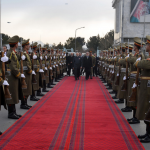In the coming days, Afghan government representatives and those from the Taliban are expected to hold their first direct talks in Islamabad. News of such a meeting comes amidst a deteriorating security situation in Kabul and other parts of Afghanistan. According to Afghan officials, the situation in northern Afghanistan has become challenging with Islamic State fighters present along with the Taliban.
It would be naïve to expect these talks to be the beginning of negotiations between the Afghan government and Taliban fighters. Only last year, a similar attempt failed soon after the first round of talks as the government realised the death of Taliban leader Mullah Omar had been kept hidden for five years. Mistrust and suspicion sabotaged holding even a preliminary meeting.
India’s commitment to a politically stable and economically strong Afghanistan is evident from the previously pledged $2 billion for relief and construction activities, and has remained steadfast. During Prime minister Modi’s visit this January, the new parliament building, funded entirely by India, was inaugurated; another milestone will shortly be reached when the $300 million Salma Dam project is completed. Damaged during Taliban rule and renamed the Afghan-India Friendship Dam, it is expected to be produce 42 MW of electricity and water nearly 80,000 hectares of farmland.
With two major projects nearing completion, India has announced 92 small development projects in Afghanistan, totalling $16 million–17 million, but with the progressive decline in the security situation there, economic cooperation will slow down, if not halt. Senior diplomats argue that it will take a few years for the situation to become clear; the conservatives, who dominate India’s foreign policy establishment, say New Delhi must “wait and watch”. It seems the government will, in all probability, stay away from exploring new options. Weeks after Modi visited Kabul and Foreign Minister Sushma Swaraj called for cooperation from Pakistan to make Afghanistan an economic hub, little has changed on the ground that would give India greater space to operate. India has no leverage with the Taliban and will have no role to play in political discussions on the future of peace talks. In fact, the future trajectory of political settlement in Afghanistan is not going to be determined by India at any stage or level.
Pakistan remains the key to any planned engagement to deepen India’s presence in Afghanistan, but its generals will never allow New Delhi a place at the high table. And with the United States in election mode, Washington will increasingly depend on Islamabad to firefight the Taliban.
India’s desire to join the Afghanistan-Pakistan Transit Trade Agreement will not be entertained, and the goal to make Afghanistan an economic hub will remain a pipe dream, given the security situation. Uzbeks and other foreign fighters operating with Afghan Taliban have transformed the security situation in the once quiet northern part bordering Central Asia. Security experts believe Pakistani generals have played a role here as they are opposed to the Ghani government using the northern territory to access Central Asia and the rest of the region. They want to ensure that Afghanistan, a landlocked country, remains at the mercy of Pakistan for both its exports and imports.
India lacks the wherewithal and capacity to checkmate Pakistan in Afghanistan. India evokes a lot of affection and goodwill from both the people and government of Afghanistan—they acknowledge New Delhi’s unstinted support and genuine role in empowering Afghanistan to stand on its feet—but, at the end of the day, they have Pakistan as a neighbour that exercises enormous control over its tribal regions and Taliban fighters, and is their sole access to the outside world and markets, and whose generals have all-pervasive control that even United States has to leverage to safeguard its interests.
It is the Iranian route India needs to seriously work on. For months, Iran had sought India expedite its decision-making process to invest in Chabahar Port on the Sistan-Balochistan border, which holds the potential for India to bypass Pakistan and reach Afghanistan. Pressure from Tehran seems to have worked: Parliament has been informed that “negotiations on an Agreement on [the] India-Iran-Afghanistan Trilateral Transit Corridor have made progress” and the next meeting of experts to finalise the clauses will shortly be held.
New Delhi needs to seriously pursue investment in and development of Chabahar. V.K. Singh, Minister of State for External Afairs, said efforts were on to get Iran back into the fold of the banking sector after U.S. sanctions were lifted, with the government also considering a request from Iranian banks to open branches in India and reactivate their accounts. India extended a $150 million credit line to Iran a few weeks ago, to help develop Chabahar Port.
India cannot blame Pakistan or China for any delay in the Chabahar Port project. Road development from the port to Afghanistan needs to be taken up with greater vigour. Besides, India needs to shed its inhibitions on developing military ties with Kabul. Sale of helicopters signalled India’s readiness to help militarily, but it cannot stop at that. New Delhi must respond quickly to requests for infantry weapons, air and ground mobility assets, and training weapons.
If the Modi government wants to have a more robust strategy apart from seriously pursuing the completion of Chabahar Port, India needs to look at innovative ways that go beyond traditional development projects.
Sunil Raman, a former BBC journalist, heads Public Affairs for Hill & Knowlton Strategies in India.
This article was exclusively written for Gateway House: Indian Council on Global Relations. You can read more exclusive content here.
For interview requests with the author, or for permission to republish, please contact outreach@gatewayhouse.in.
© Copyright 2016 Gateway House: Indian Council on Global Relations. All rights reserved. Any unauthorized copying or reproduction is strictly prohibited


